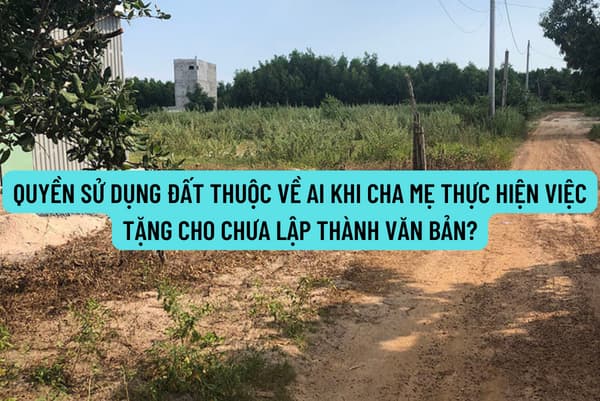Title: To Whom Does the Land Use Right Belong When Parents Have Not Formalized a Gift in Writing? Can Parents Reclaim the Land if the Child Builds a House on the Gifted Land?
Who Holds Land Use Rights When Parents Gift Land Use Rights Without Written Documentation?
According to Point a, Clause 4, Article 95 of the 2013 Land Law regarding land, housing, and other property attached to land registration, the regulations are as follows:
Land, Housing, and Other Property Attached to Land Registration
...
4. Registration of changes is carried out for cases that have been granted a Certificate or registered but there are subsequent changes as follows:
a) Land users, owners of property attached to land exercise their rights to convert, transfer, lease, sublease, inherit, gift the land use rights, property attached to land; mortgage, contribute capital using land use rights, property attached to land;
...
According to Clause 3, Article 167 of the 2013 Land Law stipulating the rights to convert, transfer, lease, sublease, inherit, gift, mortgage, contribute capital with land use rights:
Rights to Convert, Transfer, Lease, Sublease, Inherit, Gift, Mortgage, Contribute Capital with Land Use Rights
...
3. The notarization, certification of contracts, documents implementing the rights of land users are carried out as follows:
a) Contracts for transfer, gifting, mortgage, capital contribution with land use rights, land use rights and property attached to land must be notarized or certified, except in cases of real estate business specified at Point b of this Clause;
b) Contracts for lease, sublease of land use rights, land use rights and property attached to land, contracts for conversion of agricultural land use rights; contracts for transfer of land use rights, land use rights and property attached to land, property attached to land in which one of the parties or all parties involved in the transaction are real estate business organizations shall be notarized or certified as required by parties;
c) Documents of inheritance of land use rights, land use rights and property attached to land shall be notarized or certified according to civil law;
d) Notarization is carried out at notary practice organizations, certification at the People's Committee of the commune level.
Based on Article 502 of the 2015 Civil Code regarding the form and procedures for executing contracts on land use rights:
Form, Procedures for Executing Contracts on Land Use Rights
1. Contracts on land use rights must be made in writing in a form suitable to the provisions of this Code, land law, and other relevant laws.
2. The execution of contracts on land use rights must follow the order and procedures prescribed by land law and other relevant laws.
Therefore, when parents gift land use rights to their child, it must be made in writing and notarized, certified by a competent authority. After notarization, certification, the registration procedure for changes – registration, transferring ownership at the land management agency must be completed.
- If these procedures have been fully performed, the gifting of land use rights will be legally valid, and the land use rights now belong to the child.
- If these procedures have not been performed and only allow the child to build a house on their land, the land use rights still belong to the parents.

Who Holds Land Use Rights When Parents Gift Land Use Rights Without Written Documentation? Can parents reclaim the land if the child has built a house on the gifted land? (Image from the Internet)
Can Parents Reclaim the Land if the Child Has Built a House on the Gifted Land?
As analyzed above, if the procedures mentioned above have not been performed and only allow the child to build a house on their land, the land use rights still belong to the parents. Parents can take the following actions to reclaim the land:
- First: Negotiate
Parents can negotiate with their child about the value of the house and repay money equal to the value of that house.
- Second: File a lawsuit to reclaim the land if an agreement cannot be reached
According to Article 166 of the 2015 Civil Code regarding the right to reclaim property as follows:
Right to Reclaim Property
1. Owners, other subjects with rights to property have the right to reclaim property from holders, users of property, beneficiaries without legal grounds.
2. The owner does not have the right to reclaim property from subjects currently holding rights to that property.
At the same time, in Article 168 of the 2015 Civil Code regarding the right to reclaim registered movable property or immovable property from an honest holder, it is stipulated as follows:
Right to Reclaim Registered Movable Property or Immovable Property from an Honest Holder
Owners have the right to reclaim registered movable property or immovable property from an honest holder, except in the cases specified in Clause 2, Article 133 of this Code.
Therefore, if no agreement can be reached, you can file a lawsuit to reclaim the property.
How is the House Divided When the Child's Spouse Divorces?
According to Clause 3, Article 59 of the 2014 Marriage and Family Law on principles for settling property of spouses upon divorce:
Principles for Settling Property of Spouses upon Divorce
...
3. Common property of the spouses is divided in kind, if it cannot be divided in kind, it shall be divided according to its value; the party receiving the portion of property in kind with a value greater than the share they are entitled to must pay the other party the difference.
Thus, according to the regulations, the common property, the house of the spouses, is divided in kind; if it cannot be divided in kind, it shall be divided according to its value; the party receiving the house with a value greater than their entitled share must pay the other party the difference.
LawNet
